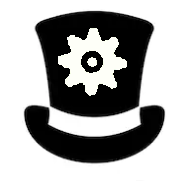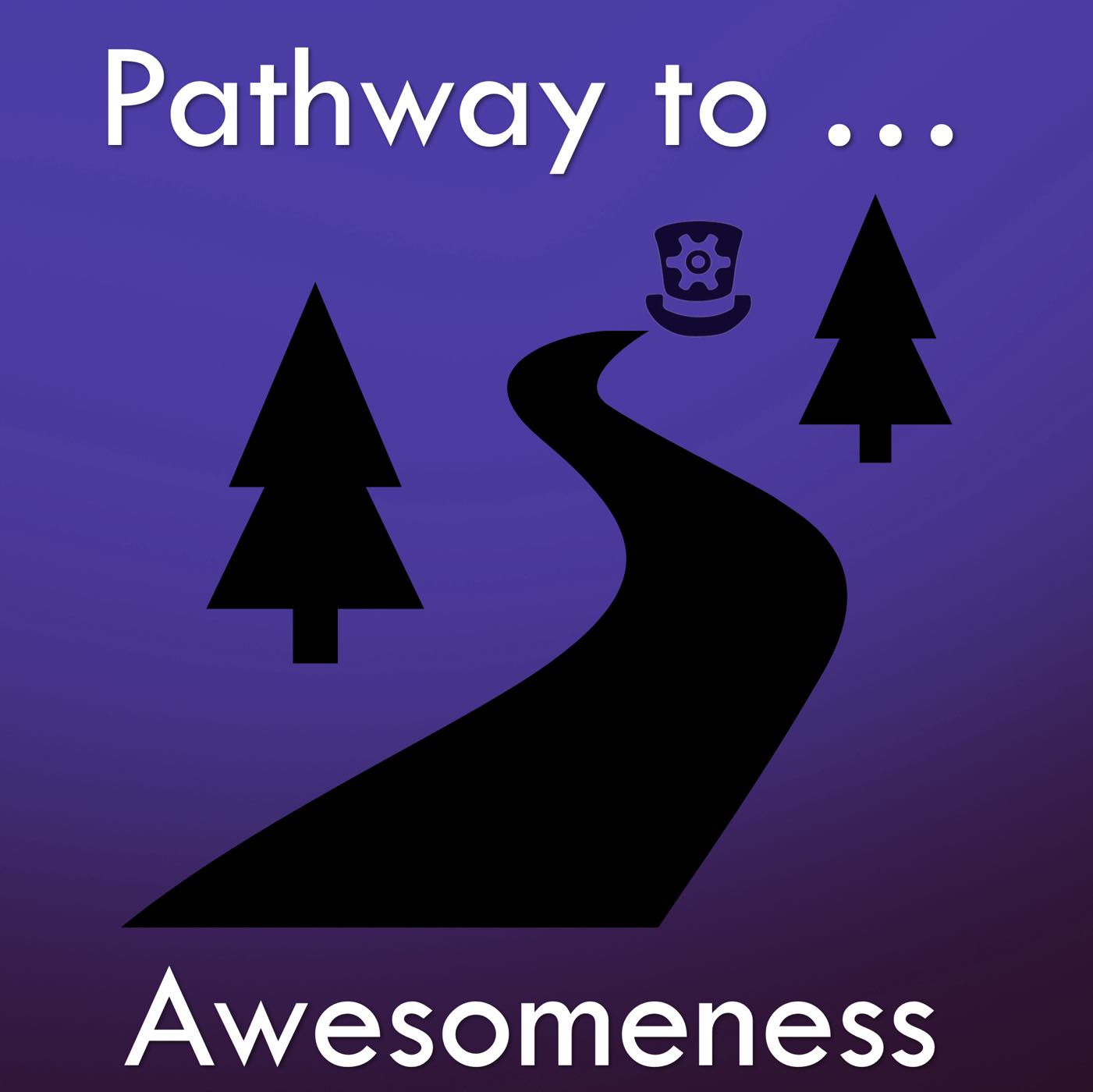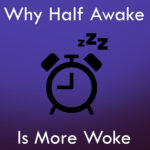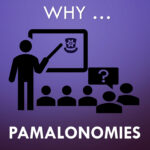If your older self could step back in time and talk to your younger self, what advice would you give? Me, I might be telling myself I had what it took to learn coding. I might direct myself into back end web development. But if I did that, then I wouldn’t have studied music in college. And then I wouldn’t know what it is like to have a degree that left me without a professional career. If that had happened, I wouldn’t have known what it was like to struggle week to week to pay bills. Don’t judge me for the bad decisions of my youth. Struggle is a teacher. And now we have pamalogy. We’ve all seen enough time loop movies to know that changing the past affects the present. We get one path or another – per Universe. Do you have a fear of missing out? What is your pathway to maximized awesomeness? That’s what we’ll talk about today. Ready?
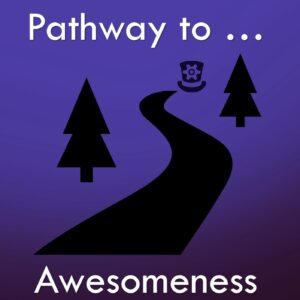
Pamalogy is the philosophy of awesomeness in the Multiverse. There may well be plenty of Universes that do include time loops. Pamalogy says that if it would be good then it’s true. Take our free Pamalogy 101 course and see why this wonderful axiom is true. If time loops can be good, then this axiom says they happen. Think about that. Just apply it. If it would be good, then you actually do have the opportunity to go back into the past and give advice to your younger self. Isn’t that cool? Of course, non-time looping Universes might be good in certain ways too. And whether that happens in this Universe, I don’t know. Maybe this is one of those time looped Universes. Could be. But if people from the future haven’t appeared to you here, then maybe this isn’t one of them. For the sake of today’s thought experiment, let’s assume it’s not.
Let’s assume that the only form of speaking to younger selves in this Universe is through older people who care about you – people like me. I’m in my mid sixties. To me that’s middle aged. I plan to keep working for the Pamalogy Society until my 120s. To me “old” doesn’t apply to anyone under the age of a hundred, but you can think of me as an older person if you want, even if you were born before me. I decided not to sleep much in my life, so I’ve effectively been awake the equivalent of some centennarians already. Long sleep periods were not a good option for me. There was too much work to do. I realized I needed to limit my sleep time to one REM cycle per night, which is about three and a half hours, once I was in my twenties and had started formulating my do-it-before-you-die list. Eventually I put that list into writing and today we’re going to talk about how my list took shape. As time and struggle continued to teach me more about myself and the world I lived in, I started revising my list. I want to describe this to you in detail, so allow a few extra minutes for this episode. In this episode, I’ll focus on how forming a list works. And in our next episode, I’ll describe some of the items on my list. Sound good?
The philosophy of awesomeness involves learning. Learning involves thinking, and thinking can be more effective if it’s put into writing. A written plan isn’t required but it can be very potent. It can also be reviewed and revised. Revision means thinking too. Have you made out your do-it-before-you-die list yet, like I asked you to? Even if the answer is you don’t have one yet, I really do want to see your list. I want to see the list of all the things you want to do before you die, or just check the pulse of how many haven’t yet made one. Think about your pathway to awesomeness. What is the best you that you could be? What needs to be on that list? What order would work best? That’s your pathway. Even if you haven’t got the first thing on it, make the habit of writing it down, if for no other reason than you can send it to me. And if not having a plan is your plan, then great. You’re finished. Later, feel free to revise that too. Living in the moment may strike you as the most awesome you that you could be and you may well be right. But you also have the liberty to revise that opinion at any time later on in life. Go for it.
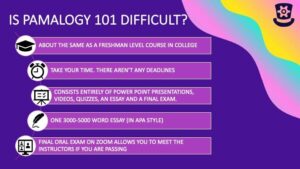
Now let’s talk about my list. We can start with what’s going on right now. Season One of the Pamalogy Society blogcast is a supplement to Pamalogy 101. S0, if you think about it, if I’m adding a supplement to Pamalogy 101, that means that Pamalogy 101 itself is in the midst of revisions. I have to complete it. Indeed, as I’m recording this, it’s being revised. The first iteration was two dozen episodes of me talking in front of a camera with a funny hat and clashing clothes. Version 2.0 of Pamalogy 101 will be more detailed, graphic intense, and professional. It offers lots of links to other resources and formalizes the logical proof that Maximized Awesomenss is true, meeting objections, and putting that question to rest. Some of the revisions are to make ideas clearer and more accessible to those new to philosophy. Others are for the sake of peer review in the philosophical community itself. The audience isn’t expected to have any knowledge of philosophy prior to the course. Yet at the same time, it was designed to be accepted by accredited Universities as an introductory level elective, so it’s got some footnotes. If you’ve taken version 1.0 of Pamalogy 101 for free, you can also take version 2.0 for free and I’d love your feedback. The pamalogy courses and blogcast have obviously all been on my list. Revising them is too. And then there is marketing them. As I’m recording this, I haven’t done that yet either.
I wish I could talk to you about your list. While I’m alive, I do plan to make myself available to my audience as much as possible. I prefer one-to-one communication. That’s why having quality conversations with tens of thousands of Uber, Lyft and Yellow Cab passengers has been so gratifying through the years. But my days of driving for a living are coming to a close. For one thing, I need cataract surgery. For another, I think its time to reach more people. So today, we’ll talk about how I made my list. I won’t have time to go through the list itself. That’ll be next time. My focus today will be on how the list gradually took shape. It will give you one example. Your own path won’t be the same. But I think it will help illustrate what I’m talking about.
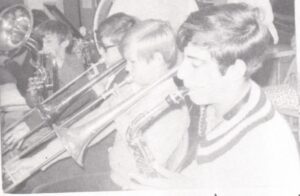
Okay. When I was young, my parents convinced me that I could be a great musician. My music teacher told them I had a very good ear and that I should play the trombone because that required a good ear, not having keys, like a saxaphone, or valves, like a trumpet. She also had me sing in barbershop quartets because that sort of music doesn’t use instruments. It requires a good ear to sing without accompaniment. So, not knowing any better, I took my music teacher’s advice and my parents bought me a trombone. Sure enough, I was pretty good at it and I had a lot of fun playing in band and various groups and eventually let my father talk me into studying music in college. But inwardly, I knew something was wrong. There was something not right about it. Playing in band was an okay pastime, but I didn’t love being on stage. In fact, I dreaded it. My knees shook when I did solo performances and my lips would freeze during recitals. Suddenly, the trombone would decide to stop doing what it had done while practicing alone, like driving a car that breaks down.
It was similar to my fear of heights. I paid for college on an athletic scholarship in springboard diving. I started diving at the age of eleven to impress a girl I liked and the more I did it the better I got. I really wanted to impress her! I actually won the Eastern US championship for my high school division my senior year. But I was definitely afraid of heights. So when I went to diving camp under an Olympic coach one summer, I was pressured into diving from a ten meter tower. In case you don’t already know, courage isn’t not being afraid. It’s overcoming fear. In diving, I did learn the dives for ten meter platforms and I did compete against Olympic quality divers like Bruce Kimball, the son of my coach, more than once. Similarly, on stage, there are techniques that can be learned to overcome stage fright. Did you know that? But voluntarily putting yourself in very uncomfortable situation on a daily basis takes encouragement and motivation. I could have used a good life coach back then. I could use one now!
I took the easy way out. I wound up attending the University of South Carolina and diving there because the recruiting coach assured me I would never have to do all those fancy dives off the ten meter tower. I’d have a full scholarship and USC only had a five meter tower, in a nice heated indoor pool. He was right. And it was glorious! So, I worked out five hours a day in a nice heated pool and never had to learn new dives again off the ten meter tower.
Note to younger self: easier tends to be good for the moment but not for the long run. Both matter. Surround yourself with visionary motivators.
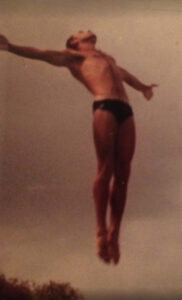
All this took place before I started making any do-it-before-you-die list. It was the stuff I had to work with. I looked at my talents and I looked at my limitations. I dove against Greg Louganis. Greg, it turns out, could jump over 40 inches high from the concrete. I could only jump 22 inches high. This was a physical limitation I was never going to be able to overcome. Plus, the fear of heights that limited me to the 3 meter board. No one told me I could ever overcome that. It seemed my diving career could only go so far. I was convinced that diving and music might both be great for discipline. They definitely sharpened my ability to focus too, but I concluded back then that neither one would serve for a career unless I wanted to coach or teach high school students.
So as to skirt my performance anxiety, my Junior year in college I switched majors from performance to composition. One of my composition teachers was Otto Luening. Otto asked me a question that stuck. He asked why I wanted to be a composer.
This made me think. It had started out that I had wanted to impress people, especially girls. Nothing had changed other than the fact that by the time I chose to major in composition, composition was all I had left if I didn’t want to be a music teacher. The girl element was still there though. I remember making a recording of a song I’d written once for an assignment that included me singing. It got played for the class and some girls started screaming as soon as they heard my voice like I was somebody famous at a concert. It was weird. I suppose that was what I was hoping for prior to that, but I still couldn’t picture being a live performer. I actually do well speaking to large crowds about things I’m passionate about, it turns out, but playing trombone or singing solos in crowds, not so much. I stayed with the composition and did do some successful recitals of works I had composed. Standing ovations and second bows were the measure of success for those things. So the decision to go into music composition wasn’t a bad one under those circumstances.
Despite the second rounds of applause, I wasn’t a great composer. I wasn’t prolific. I had some pretty serious writer’s block. Writing music was something brand new for me. And then something happened. For my senior project my parents drove up to South Carolina from Palm Beach to hear it and help me move back home. It was a trombone trio sonata in four movements that I had worked on the whole spring semester. But as Maximized Awesomeness would have it, the other two trombone players didn’t show up for the recital. They were in the midst of finals and moving home themselves, skipping any classes and activities that they could. I should have anticipated that. But worse, in the scramble to pack and move home, I had somehow lost my entire music portfolio. I spent the day looking everywhere for it. Two years of work was missing. Imagine my panic.
But … let me take you back to Otto Luening’s question. Why? Why did I want to study music composition? Was it girls? Of course it was. I knew that the second he asked it. But what stuck with me in that question was all of the answers I couldn’t give. I didn’t do it because I loved doing it. I didn’t do it because I thought I was great at it. I was new at it, just learning it. And there was a fourth reason, a reason that came only later. I wasn’t doing it to change the world. I was doing it for myself.
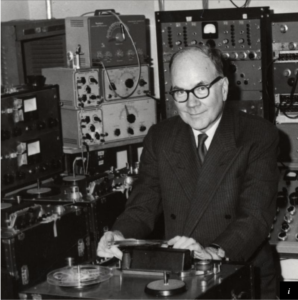
That year is the year I became a philosopher. Never did I hear music the same way after I started asking why I wanted to write it, like Otto had asked me to. Why did Bach compose? Why Beethoven? Why John Cage? Why Charles Ives? These were held up to me by my teachers as the best composers history had? Why did they do it? I had thought about this for the remaining two years I had before I graduated. One summer day during that time, I considered the Beatles. What a huge audience they were able to reach! Music of today was something that could be used for much good or much evil. It could influence the masses. From Bach I learned music could be a form of worship in beauty. From Beethoven I learned it could be the first voice in silence – quiet, yet dramatic and loud, even in one’s own mind. In case you don’t know, Beethoven was deaf, but his compositions were amazing.
Then there was John Cage. From John Cage I learned that music didn’t have to be defined traditionally. And there were the Hindus. From the Hindus, I learned that music was mystical. It could reflect and convey a spirit, whether holy and good, or demonic and evil, or just some mood. It dawned on me that I might be able to combine influence and spiritual mood one day. In consideration of Hindu music, I asked what the good spirit to influence the world with might be. What was truly good? And what was music? There was also jazz. Jazz combos reminded me of conversations without words, reflecting character and relationships. John Cage probably had the greatest affect on me of all of these. I spent a lot of time reflecting on the fact that music could be anything, not just traditional instruments and songs. I spent countless hours in a state of wonder, listening to nature itself, and socializing people and other random things in life, as music. There were days when it seemed like all of life itself was God’s composition. The Bible plainly states that this is the day that the Lord has made. I learned to rejoice in it and be glad.
So, as I drove uncomfortably with my parents back home from college, knowing they believed I was a liar, not really having written any trio sonata, I took consolation in the fact that the Lord was writing my life and that the journey home itself was a movement in God’s masterpiece. In God’s first movement, music was being taken away from me. Philosophy was taking its place.
I lived with my parents for a few years after that, parking cars, taking a job at a bank, delivering newspapers and pizza and I saved some money. Then when I upped my pay level by snagging a job as a letter carrier for the Post Office. I was urged to move out on my own, so I did, but not before my father and I were able to connect on spiritual matters. He came to realize I had a gift he hadn’t seen before and encouraged me to become a Catholic priest. If you’ll remember, I told you in a previous episode that my parents always argued about religion. My mother was Presbyterian. My father was Catholic. My father and I went to a retreat together and he heard me speak there. I had always been open to suggestions, so at Dad’s urging, I actually tried out the Catholic Seminary. I did post graduate studies there for about four years while carrying mail for a day job, but while becoming a priest was a consideration, it never made it to my list. Influencing people for good was on my list, but not performing rituals, not even as a priest. What if I forgot my lines? I’d also have to fully embrace Catholicism. I considered fully owning it, but there were a number of things that didn’t seem right.
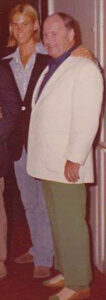
I had questions both about the Catholic faith and about my mom’s Prebyterian faith. I won’t go into any of that today. Here, I’m just demonstrating through my own example, how the process of forming a do-it-before-you-die list works. It involves a pathway. I started out pretty clueless about what I was here for. I let other people impose their ideas on me and direct me, only to find out that they weren’t quite right – not for me. I had to discover my own awesomeness myself – the thing or things I was best suited for. What would I fully embrace? What can you pour your heart into knowing you’re on track?
You don’t necessarily know at first. Discovering it may involve a lengthy path. Now if I had just learned to code, I would probably never have considered the priesthood. Coding would have led to cushy jobs and no dilemma about the meaning of music or of life. As I think about it, it’s unlikely that I would have developed pamalogy if that was the case. I’m not sure about that though. Some of pamalogy seems so obvious. Why are we here? Odds are we should not be born yet, or dead long ago, yet now is the time we have consciousness. How can anyone assume that time just moves on and we just happen to be lucky that the point in time we call now coincides with the time for us to be alive? That’s ridiculously improbable.
Also, if I was a coder, I would be better attuned to the process of computation. How can anyone not know that if the Universe is fundamentally comprised of information, and all possibility is simply the total set of possible information, a matter of information itself, that every possible computational process is included in all possibility, including the formula and process for our presence now, and that that computational reality as information is timeless in all conceivable places?
But I digress. The pathway to awesomeness begins with all of what we’ve learned so far about the world and about ourselves. Forming a list begins with bad guesses about what would be ideal. When we are off base, there is a part of us that may sense we are. So, if I thought I was going to be a famous musician, that might be an item I would put on my list but later remove after learning more about myself and the big picture. I started to see what I wanted on my list when I discovered my strength and passion. I discovered I was a philosopher who wanted to have a maximally positive impact on the world before I died. This was vague at first. It was very general but time would help make it more specific.
I advocate writing down your list as soon as possible. Do you treat your life as if it was a business? We might do well to treat our lives like a business. We might want to write down our vision, our mission and our long and short term goals. A vision is a description of what your ideal relationship with the world would be. It’s a character statement that describes your awesomeness and your impact. Your mission is a concrete proposal that brings forth the achievement of that vision. And your goals are the steps that help you achieve that mission. They are your map – they are the pathway to your awesomeness.
Once I knew I wanted to maximize my positive impact in the world, I started looking for ways to accomplish it. At first, I thought it might come about through recording some music, but that proved to be a bad first step doing it alone. I needed friends in the business to help with the engineering – that and some hit songs. This could have happened but it never came to that, mostly because I was trying to do it alone.
Speaking of alone – I didn’t want to be single either, and that can be distracting. As a married man, I haven’t experienced loneliness for over thirty years, but I remember being very lonely when I was younger. I dated a number of women in my twenties and that helped me figure out who I was. As I got to know them better, I couldn’t picture being with them. I met the woman I would marry when I was in my thirties. Like many young couples, my wife, Lisa and I didn’t fully understand one another’s visions coming into the marriage. I don’t blame her. My vision was still in the process of becoming clearer, so how could she have seen it? Her vision turned out to be considerably different than mine. In marriage, I’ve concluded, it may not be that the vision of both partners is the same, nor does it have to be. What matters is their compatibility. So long as my vision isn’t in conflict with hers, the marriage can be mutually supportive where it matters most. Her vision is as a conservative Christian evangelical convincing large numbers of people to turn their hearts over to Jesus, most especially our children. She also envisions travel and vacation time and the security of a modest home. When we were young, she pictured enjoying visiting grandchildren and nice vacations. But on our thirteenth anniversary she had a severe stroke that left her paralyzed on one side for life and our children still haven’t married or had kids of their own. Her health is declining so she may never meet her grandchildren and she can’t enjoy travel any more for all the fuss of wheel chair transportation and such.
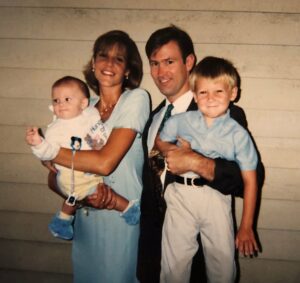
How different we are! My vision is of maximizing awesomeness, family included, by teaching pamalogy and seeing the projects listed at JamesCarvin.com eventually thrive – my do-it-before-you-die list. It takes multiple seasons of blogcasts to share in detail what my vision is – a whole set of courses. I picture leaving my vision itself as my legacy, so that when I die, others can carry it out. But all that said, as different as our respective visions are, they aren’t incompatible. They are mutually supportive. Lisa wants me to succeed. And I do what I can to comfort her and keep holding on to the hope she will enjoy more vacations and get to visit and hold our grandchildren one day.
So let that be a lesson learned. Life involves gradual self-discovery and adjustment. A marriage partner isn’t your clone, but they can’t be toxic to you either. You need to know them well enough to make an educated guess that they’ll be compatible with you, especially with regard to your vision, if you’ve come to see it yourself. This is why it behooves you to start seeing and discerning your vision early. For one thing, it could save you from a bad marriage. There are many things that can contribute to a divorce. A conflict of visions is one of them. So, as for you achieving your optimal awesomeness, in other words, your vision, be careful who you partner with and also recognize that vision morphs, grows and becomes clearer.
My sense of vision became clearer in an odd way. I had been recruited as an adjunct professor for an Orthodox Christian college to put their curriculum online. The bishop seemed hateful towards Protestants. He even pronounced the word “ProTESTants” to emphasize the notion that those of the Reformed tradition had a rebellious spirit. Sometimes, you have to see what feels like hatred, to rethink things. Seeing I was soft on Protestants, he assigned me to be an ecumenical liaison with the Catholics and later wrote a letter assigning me to be a missionary to the Protestants, to preach the message of Elijah, as well. He himself turned out to be highly controversial within the Orthodox Church. I won’t go into their internal politics. My takeaway from it all is that some things will open your eyes. Open eyes are a key component for clear vision.
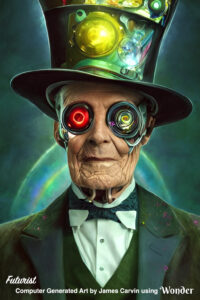
That bishop also stirred up some other events in my life, which prompted me to quit the Postal Service after sixteen years. This was tragic because it happened right when I had been about to get one of my inventions to market. I had planned on quitting the Post Office eventually but not under duress or so soon. It’s a fascinating side story but I won’t go into details today. Here I just want to mention that the first of the items on my list, as it was starting to get clearer in my mind, was an invention I call the Ghost Machine, which you can read about at ghostsurfers.com.
In general, in my life, I take mundane jobs that don’t require much concentration and don’t worry me when I get home, and I use those jobs as a financial cushion so I can pursue entrepreneurial endeavors, building prototypes I can concentrate on after hours. There is a lot to be learned from this. Also, if I had been able, I would have done well to put money aside and let it work for me so I would be better self-capitalized for my start ups. Unfortunately, that didn’t happen. I got short-sided on capital when I quit the Post Office prematurely. When my parents kicked me out of their house after college, my savings went to a downpayment on a townhome, that in the mid 1980s did not appreciate in value. So, I’ve never had money that I could leverage through investments. Still, I was a gifted inventor. I was actually very good at predicting technological innovation and market trends.
In the final analysis, I wanted to use the Ghost Machine to make some money and develop a platform of communication for other endeavors, including a summation of my philosophical thought, probably learned through third party biographers on Wikipedia. At the turn of the Millennium, I hadn’t yet come up with the name Pamalogy to describe my philosophical system but thoughts about the Multiverse and the probability of consciousness at a given point in time and God as Maximized Awesomeness have all been parts of my thought process. The HAND System was also something I came up with in the early 1980s. At the time, I had wanted to communicate all these things but lacked an adequate vehicle. Today, the Pamalogy Society ties these diverse concepts together as a non profit organization whose mission it is to teach this philosophical system and facilitate pamilonomies.
I’ll close on a note about pamilonomies. A pamalonomy is a high potential impact concept stage enterprise that will either be a non profit organization or owned by product or service providers and users, rather than by third party shareholders. The Pamalogy Society will facilitate strategically selected projects within this scope by raising funds and providing volunteers to staff them. Each of the programs listed at JamesCarvin.com is a pamalonomy candidate. In the next episode, I’ll offer a summary of some of these projects and show what I mean by stategy. Having conveyed this, I want to encourage you to submit your own proposal in the form of your list. Now that you’ve seen how lists are formed and you know that I want to see your lists, feel free to offer the same sort of background regarding your proposals as I’ve offered here and will offer on the next episode.
My vision is not enough. I want to know yours. Being strategic involves what order we do our projects in, how we revise our list over time, and how we contribute to it to ensure its optimal success, as well as how we work together to achieve it. By the time I’ve shown you how my own list works, you will have had the chance to see how your own list might add to it. It’s a cliché acronym, but Together Everyone Achieves More – TEAM. Welcome to the society. We’re a team. Ciao!
URL for sharing this transcript page: https://pamalogy.com/2022/12/05/the-pathway-to-awesomeness
URL for sharing this podcast: https://player.captivate.fm/episode/873c4a11-0021-4535-adc2-0d24c13d60d8
URL for sharing just the audio file: https://podcasts.captivate.fm/media/4d886f79-e149-41e6-bea4-0f48b85f98dd/Episode24-PathwaytoAwesomeness-converted.mp3
Previous: Why Half Awake is More Woke
Up Next: Why Pamalonomies
